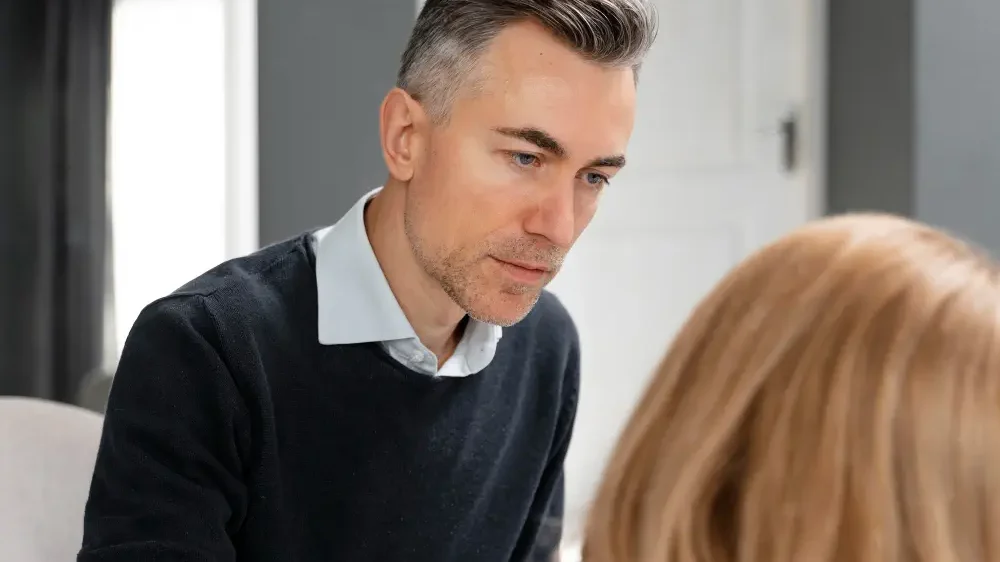We offer medical detox and multiple addiction treatment options in our
luxury treatment centres in Port Hope, Cobourg, and Ottawa.
The Importance of Grief and Loss Counselling in Addiction
Grief and addiction share a tangled relationship that touches millions of Canadians. Someone loses a loved one, their job, or their health—the overwhelming emotional pain drives them towards substances for relief. This temporary escape quickly develops into dependency. A cycle emerges where grief fuels addiction and addiction creates more losses. Breaking this pattern demands specialized care addressing both conditions simultaneously. Professional grief and loss counselling integrated with addiction treatment provides the support needed for lasting healing and recovery.

Key Takeaways
- Why grief triggers addiction: Unprocessed losses create emotional pain that substances temporarily mask, but this coping mechanism prevents natural healing and increases dependency risk
- What types of losses need addressing: Beyond the death of loved ones, addiction recovery involves grieving the loss of identity, relationships, health, and even the substance itself
- When professional help becomes necessary: Complicated grief lasting beyond normal timeframes, or grief interfering with recovery progress, requires specialized grief and loss counselling
- How integrated treatment works: Combining grief counselling with addiction treatment addresses root causes rather than just symptoms, improving long-term recovery outcomes
- Where family healing fits: Grief affects entire family systems, making family-centered grief treatment crucial for sustainable recovery and relationship repair
Why Does Grief Often Lead People Toward Substance Use?
Grief hits like a freight train. Your chest feels crushed. Sleep becomes impossible. Getting dressed feels like climbing Mount Everest. When alcohol or drugs offer temporary relief from this crushing weight, people reach for that lifeline. Tomorrow's consequences? They don't matter when you're drowning today.
The brain science explains this connection. Grief and addiction light up overlapping circuits related to attachment and reward systems. Substances flood the brain with dopamine—directly countering grief's crushing effects on these same pathways. A vicious cycle starts: grief triggers substance use, which then blocks the natural healing processes that healthy grieving requires.
Common Grief Triggers That Lead to Addiction:
- Sudden, unexpected losses - accidents, overdoses, suicide attempts
- Childhood trauma and unresolved losses - abandonment, abuse, early deaths
- Multiple concurrent losses - job, relationship, health happening simultaneously
- Witnessing traumatic deaths - violence, overdoses, accidents
- Anniversary reactions - holidays, birthdays, death dates triggering intense emotions
Canadian research shows something startling. People experiencing major losses face 2.3 times higher risk of developing problematic substance use within two years of bereavement. That risk skyrockets when grief remains unaddressed through professional grief and addiction recovery support.
Here's how it typically unfolds. First, substances provide blessed emotional numbing—like a warm blanket around raw nerves. Tolerance builds. Higher amounts become necessary for the same relief. Physical dependence creeps in alongside psychological reliance on substances to manage grief symptoms. Without addiction counseling which includes grief work, this pattern continues until a crisis forces intervention.
What Types of Loss Do People Face During Addiction Recovery?
Recovery brings multiple layers of loss that blindside many people. Each loss needs individual attention and processing. Otherwise, emotional overwhelm drives people straight back to substances.
Losing the substance itself ranks among the most profound challenges. Drugs or alcohol often served as someone's most reliable companion. People disappoint you. Substances never do. They are always there—through breakups, job losses, family fights. Letting go means mourning what feels like your best friend's death.
Relationship casualties cut deep during recovery. Addiction destroys family bonds, kills friendships, ends romantic partnerships. Some relationships heal with time and professional family therapy. Others die permanently. Both outcomes demand grief work.
Identity crisis strikes hard. "Who am I without this substance?" becomes a haunting question. Professional identities crumble. Social roles shift dramatically. The person who was "the life of the party" must discover entirely new ways of existing in the world.
Health and opportunity damage represents irreversible consequences requiring grief work. Years of substance use create permanent health problems, destroy career advancement, devastate finances, steal time with growing children. These losses can't be undone—only grieved and somehow integrated into a new life story.
How Does Professional Grief and Loss Counselling Support Addiction Recovery?
Grief and loss counselling transforms recovery by tackling the emotional pain that often fuels continued substance use. People frequently experience emotional relapses before physical ones. Processing underlying losses prevents this dangerous progression.
Evidence-based approaches anchor effective grief treatment centres. Cognitive-Behavioral Therapy (CBT) helps identify twisted thought patterns around loss while building healthier perspectives. Complicated Grief and Substance Use Treatment (CGSUT) represents specialized integration designed for people facing both challenges. Studies prove participants experience 60% fewer cravings and 45% lower depression compared to standard addiction treatment alone.
Group grief processing breaks isolation while creating mutual support networks. Sharing experiences with others facing similar losses normalizes the grief experience. People discover they're not alone while learning healthy coping strategies through peer modeling.
At Canadian Centre for Addictions, grief and loss counselling happens alongside medical detox, individual therapy, and family programs. This approach ensures grief doesn't sabotage recovery progress while addiction recovery skills support healthy grief processing.
Family involvement proves crucial since grief ripples through entire family systems. Our approach includes family grief counselling sessions where relatives learn to support their loved one while processing their own losses related to addiction's family impact.

When Should Someone Seek Professional Help for Grief During Recovery?
Spotting when grief requires professional intervention prevents recovery setbacks while protecting mental health. Early recognition leads to better outcomes.
Warning Signs Demanding Immediate Attention:
Persistent complicated grief symptoms:
- Intense grief lasting longer than 12 months without improvement
- Complete inability to accept the loss or move through grief stages
- Persistent yearning that derails daily functioning
- Avoiding people, places, or activities connected to the loss
Grief threatening recovery stability:
- Increased substance cravings triggered by grief episodes
- Isolating from recovery support systems and meetings
- Skipping therapy sessions or dodging treatment responsibilities
- Expressing complete hopelessness about recovery possibilities
Physical and emotional red flags signal the need for professional support. Sleep disturbances persisting beyond a few weeks, appetite changes affecting health, relentless anxiety, thoughts of self-harm, and the inability to function—all warrant immediate attention.
Anniversary reactions challenge even people doing well in both grief and addiction recovery. Professional support prevents temporary setbacks from becoming major relapses during predictably difficult periods.
Earlier professional help typically produces better results. Waiting until grief becomes overwhelming or threatens recovery makes intervention more difficult and time-consuming. Prevention-focused addiction counseling with grief components helps people build healthy coping strategies before a crisis hits.
What Does Grief and Loss Counselling Look Like at CCFA?
Canadian Centre for Addictions weaves grief and loss counselling throughout our treatment programs. We recognize that unprocessed losses often drive continued substance use.
Individual grief therapy runs parallel to regular addiction counseling sessions. One-on-one meetings with counselors trained in both addiction and grief work help clients identify and systematically process specific losses.
Group grief processing occurs through weekly specialized sessions. Clients share experiences and support each other's healing. Many discover they're not alone in their grief experiences.
Family grief counselling addresses how addiction affects entire family systems. It helps relatives process their own grief while learning effective support strategies.
Our luxury therapeutic settings in Port Hope and Cobourg create ideal conditions for vulnerable grief work. Comfortable private spaces and peaceful grounds support the emotional openness required for processing difficult losses.
Our partnership with University of Toronto includes ongoing research on grief's impact on addiction recovery outcomes. This research shapes our treatment approaches, ensuring we implement the most effective interventions based on current evidence.
Lifetime aftercare support recognizes that grief doesn't end when formal treatment concludes. Anniversary reactions and new losses may require professional assistance years later. Our aftercare program includes ongoing grief support whenever needed.
Our 95.6% success rate reflects our commitment to addressing all factors contributing to addiction, including unresolved grief. Healing emotional wounds alongside physical dependency helps clients build sustainable recovery foundations.

How Can Families Support Loved Ones Through Grief and Addiction Recovery?
Family support dramatically impacts both grief processing and addiction recovery outcomes. Well-meaning relatives sometimes accidentally hinder healing without professional guidance, though.
Education becomes the foundation for family members. Understanding that grief and addiction both involve brain changes helps families respond with compassion rather than frustration when progress crawls or stalls.
Family therapy participation teaches relatives how to provide appropriate support while maintaining healthy boundaries. CCFA's family programs help distinguish between helpful support and enabling behaviors that might sabotage recovery efforts.
Allowing natural grief expression challenges families desperate to eliminate their loved one's pain. Learning to sit with someone's grief without trying to fix it demonstrates powerful support that facilitates genuine healing.
Patience during setbacks becomes crucial since both grief and recovery involve ups and downs. Family understanding during difficult periods prevents additional shame that might trigger relapse or complicated grief reactions.
Professional guidance from grief treatment centres helps families navigate this challenging path successfully. Without support, families often repeat the dysfunctional patterns that contributed to addiction problems initially.
Moving Forward Together
Grief and addiction intertwine in ways that demand specialized professional attention. Attempting to address substance dependency without processing underlying losses often produces incomplete recovery vulnerable to relapse during future challenges.
At Canadian Centre for Addictions, our integrated approach to grief and loss counselling provides the support necessary for lasting healing. Our luxury residential programs, evidence-based therapies, and lifetime aftercare ensure you receive appropriate help for as long as needed.
Recovery becomes achievable when grief receives proper attention. Your losses matter. Your pain deserves validation. Healing remains possible with the right professional support.
Ready to begin your healing process? Contact Canadian Centre for Addictions at 1-855-499-9446 to learn how our grief and addiction counseling programs can help you or your loved one find peace and lasting recovery.
FAQ
Can grief counselling prevent addiction from developing?
Early grief intervention dramatically reduces addiction risk. Professional grief and loss counselling helps people develop healthy coping mechanisms, preventing progression from grief to substance dependence that often occurs when losses remain unprocessed.
How long does grief counselling typically last during addiction treatment?
Grief work continues throughout treatment and often extends into aftercare. Initial intensive processing happens during residential treatment, with ongoing support available through our lifetime aftercare program as needed.
Do you treat grief from non-death losses like divorce or job loss?
Absolutely. Our grief and loss counselling addresses all types of losses, including relationship endings, career changes, health problems, and major life transitions that can trigger substance use or complicate recovery efforts.
How do you handle grief from losses caused by addiction itself?
Self-blame and guilt require specialized therapeutic approaches. We help clients process responsibility appropriately while developing self-compassion necessary for sustainable recovery and healing from addiction-related consequences.
What happens if someone experiences a new loss during recovery?
New losses during recovery require immediate professional attention to prevent relapse. Our aftercare program provides emergency grief support and can recommend intensive interventions to maintain recovery stability during crisis periods.






